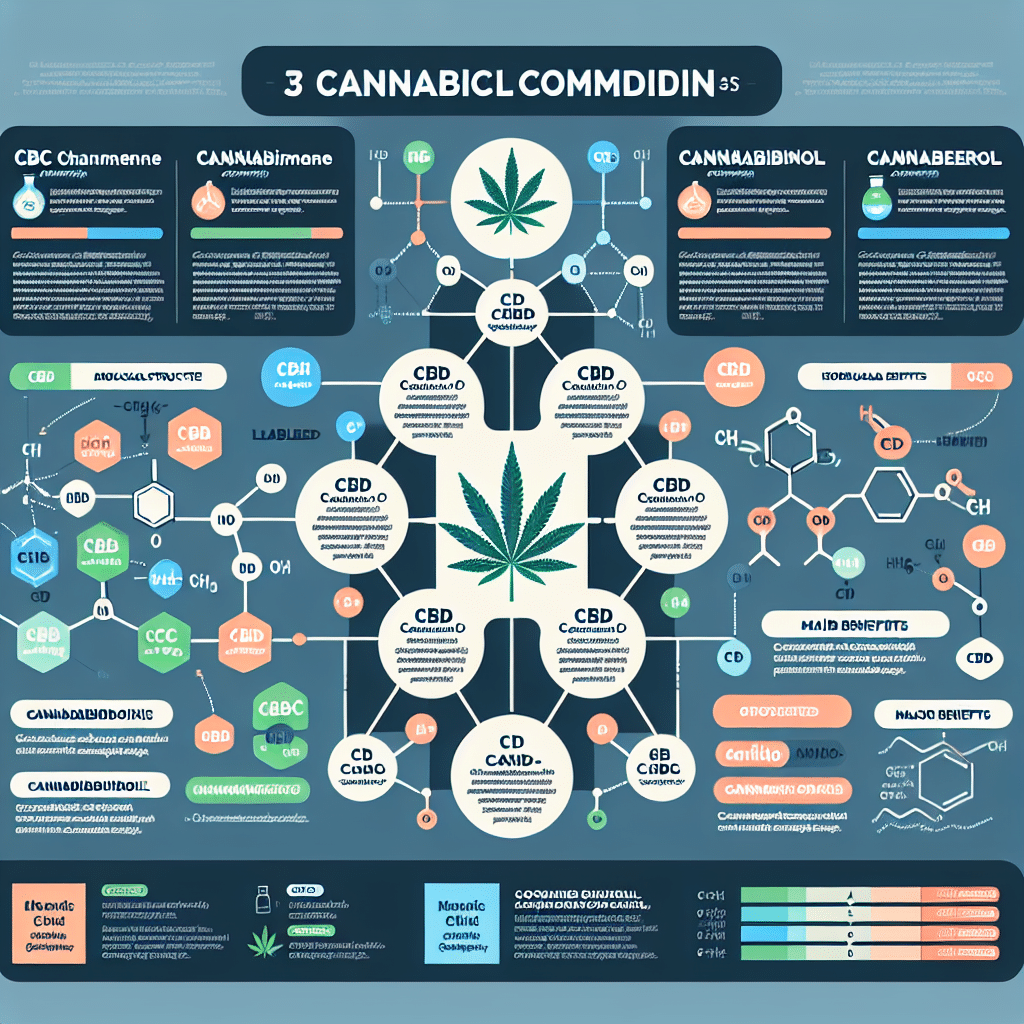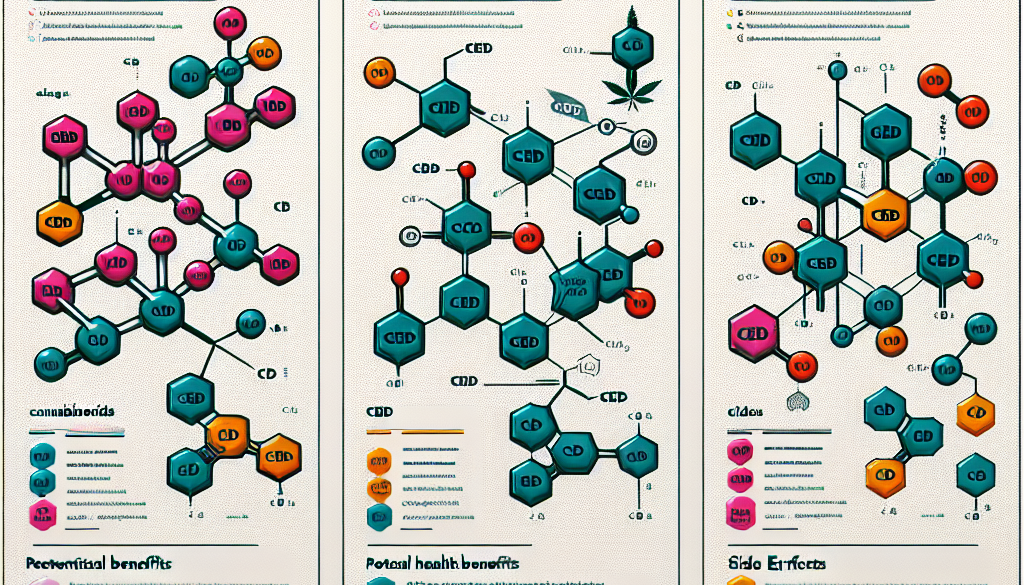CBC vs CBD vs CBG Explained
-
Table of Contents
- CBC vs CBD vs CBG: Unraveling the Differences and Benefits
- Understanding Cannabinoids: The Basics
- What is CBC (Cannabichromene)?
- What is CBD (Cannabidiol)?
- What is CBG (Cannabigerol)?
- Comparing CBC, CBD, and CBG
- Case Studies and Research
- Legal Status and Availability
- Conclusion: Key Takeaways on CBC, CBD, and CBG
- Discover ETChem’s Protein Products
CBC vs CBD vs CBG: Unraveling the Differences and Benefits

The world of cannabinoids is vast and complex, with ongoing research continually adding to our understanding of its numerous components. Among the many cannabinoids found in the cannabis plant, CBD (Cannabidiol) has gained significant popularity for its therapeutic benefits without the psychoactive effects associated with THC. However, lesser-known cannabinoids like CBC (Cannabichromene) and CBG (Cannabigerol) are also emerging as important compounds with unique benefits. This article delves into the distinctions and potential advantages of CBC, CBD, and CBG, providing a comprehensive guide to these fascinating molecules.
Understanding Cannabinoids: The Basics
Cannabinoids are a class of diverse chemical compounds that act on cannabinoid receptors in the body. These receptors are part of the endocannabinoid system (ECS), which plays a crucial role in regulating a variety of physiological processes, including pain sensation, mood, appetite, and memory. The cannabis plant produces over 100 different cannabinoids, each with its own effects and potential therapeutic benefits.
What is CBC (Cannabichromene)?
CBC is one of the non-psychoactive cannabinoids found in the cannabis plant. It is considered one of the “big six” cannabinoids prominent in medical research. CBC is produced in the plant’s trichomes and is believed to have anti-inflammatory, antibacterial, and antifungal properties.
- Anti-inflammatory Effects: Research suggests that CBC may contribute to the overall analgesic effects of cannabis. CBC may help reduce inflammation and pain without the psychoactive effects of THC.
- Antibacterial and Antifungal Properties: Studies have shown that CBC exhibits antibacterial effects against a variety of bacterial strains and possesses antifungal properties as well.
- Neurogenesis: CBC is unique in its potential to promote neurogenesis, the growth of new brain cells, which could have implications for neurodegenerative diseases.
What is CBD (Cannabidiol)?
CBD is arguably the most well-known cannabinoid after THC. It is renowned for its wide range of therapeutic benefits and is used in various products, including oils, edibles, topicals, and capsules. Unlike THC, CBD does not produce a high, making it an appealing option for those seeking relief without intoxication.
- Anxiety and Stress Relief: CBD has been shown to reduce anxiety in both human and animal studies, making it a potential treatment for anxiety disorders.
- Pain Management: CBD may help manage chronic pain by affecting the endocannabinoid receptor activity, reducing inflammation, and interacting with neurotransmitters.
- Neuroprotective Properties: CBD’s ability to act on the ECS and other brain signaling systems may provide benefits for those with neurological disorders.
What is CBG (Cannabigerol)?
CBG is often referred to as the “mother of all cannabinoids” because other cannabinoids are derived from cannabigerolic acid (CBGA), an acidic form of CBG. Like CBC and CBD, CBG is non-psychoactive and has a range of potential therapeutic effects.
- Glaucoma Treatment: CBG may be particularly effective in treating glaucoma because it reduces intraocular pressure.
- Anti-inflammatory and Antibacterial: Similar to CBC, CBG has been found to have anti-inflammatory and antibacterial properties.
- Appetite Stimulation: CBG has been shown to stimulate appetite in preliminary animal studies, which could be beneficial for individuals suffering from conditions that reduce appetite.
Comparing CBC, CBD, and CBG
While CBC, CBD, and CBG share some similarities, they also have distinct differences in their effects and potential applications. Here’s a comparative overview:
- Psychoactivity: None of these cannabinoids are psychoactive, meaning they do not produce the “high” associated with THC.
- Therapeutic Effects: All three have anti-inflammatory properties, but they differ in their other therapeutic effects. For example, CBD is widely recognized for its anxiety-relieving properties, while CBG shows promise as an appetite stimulant.
- Research Status: CBD is the most researched cannabinoid among the three, with a growing body of evidence supporting its benefits. CBC and CBG are less studied, but emerging research indicates they have unique therapeutic potentials.
Case Studies and Research
Several studies have highlighted the potential benefits of these cannabinoids. For instance, a study published in the “Journal of Psychopharmacology” found that CBD reduced anxiety in individuals with social anxiety disorder. Another study in the “European Journal of Pain” showed that CBD applied on the skin could help lower pain and inflammation due to arthritis.
Research on CBC and CBG is less extensive but growing. A study in “Pharmacology & Pharmacy” suggested that CBC might contribute to the analgesic effects of cannabis. CBG has been studied for its potential neuroprotective effects and as a treatment for inflammatory bowel disease in animal models.
Legal Status and Availability
The legal status of CBC, CBD, and CBG varies by country and state, with laws often changing. In many regions, CBD is legal when derived from hemp, while the legal status of CBC and CBG is less clear. Consumers should check their local laws before purchasing or using these cannabinoids.
Conclusion: Key Takeaways on CBC, CBD, and CBG
In conclusion, CBC, CBD, and CBG each offer unique benefits and potential therapeutic applications. While CBD remains the most well-known and researched, CBC and CBG are gaining attention for their own merits. As research continues to evolve, the full potential of these cannabinoids will become clearer, potentially leading to new treatments for a variety of conditions.
Discover ETChem’s Protein Products
If you’re interested in exploring the world of proteins and their benefits, consider ETChem’s range of high-quality protein products. ETChem is a reputable manufacturer and supplier known for their premium collagens, including marine, fish, bovine, chicken, and types I, II, and III collagens. Their products are ideal for various industries, from nutraceuticals to food and beverage. For more information on their offerings, please contact ETChem.
About ETChem:
ETChem, a reputable Chinese Collagen factory manufacturer and supplier, is renowned for producing, stocking, exporting, and delivering the highest quality collagens. They include marine collagen, fish collagen, bovine collagen, chicken collagen, type I collagen, type II collagen and type III collagen etc. Their offerings, characterized by a neutral taste, instant solubility attributes, cater to a diverse range of industries. They serve nutraceutical, pharmaceutical, cosmeceutical, veterinary, as well as food and beverage finished product distributors, traders, and manufacturers across Europe, USA, Canada, Australia, Thailand, Japan, Korea, Brazil, and Chile, among others.
ETChem specialization includes exporting and delivering tailor-made collagen powder and finished collagen nutritional supplements. Their extensive product range covers sectors like Food and Beverage, Sports Nutrition, Weight Management, Dietary Supplements, Health and Wellness Products, ensuring comprehensive solutions to meet all your protein needs.
As a trusted company by leading global food and beverage brands and Fortune 500 companies, ETChem reinforces China’s reputation in the global arena. For more information or to sample their products, please contact them and email karen(at)et-chem.com today.




